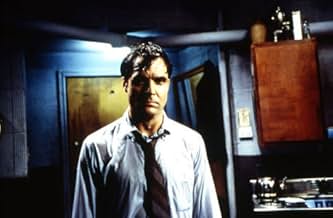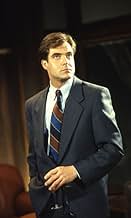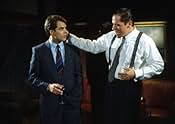Aggiungi una trama nella tua linguaSociety will always present problems--we can look for the best outcome within our beliefs.Society will always present problems--we can look for the best outcome within our beliefs.Society will always present problems--we can look for the best outcome within our beliefs.
- Premi
- 1 vittoria in totale
Pamala Tyson
- Madam
- (as Pamela Tyson)
Trama
Lo sapevi?
- Citazioni
[last lines]
The Underground Man: Maybe I'm more alive than you. But that's it. No more notes from the underground.
- Curiosità sui creditiNo Russian authors were killed or injured during the filming of this motion picture.
Recensione in evidenza
For anyone who has read Dostoevsky's novel upon which this film is based, they will be pleasantly surprised to find that Gary Walkow has done a superb job of adapting it to the screen and placing the story in a modern context. Of course, those who haven't read the book will not be disappointed--it stands on its own as a relentless critique of (post)modernity and an examination of forms of all-inscribing social control that permeate one human being's alienated existence.
The Underground Man (played brilliantly by Henry Czerny) is, in his own words, "a sick man". In every interaction he sees only the potential to dominate or be dominated; human relations for him are a disease. He is spiteful, frightened, and ashamed of his condition and his perceived inability to change. In order to mitigate the sting of such painfully acute self-awareness/self-consciousness, the Underground Man creates a video diary, in which he records his "confessions" about his interactions with others. These "confessions", while "sincere" expressions of self-loathing and a tortuous desire to change, end up being ultimately dishonest--he cannot even finish some entries because of his awareness that confessions for an unseen "audience" provide him with nothing but shallow comfort and artificial relief.
In the film we see the Underground Man fantasize about becoming the strong, desirable, upright person he wishes to become, only to later criticize these fantasies and his reliance upon the very constructs or images of "strong", "desirable", and "upright" he so despises. It is the perceived irreducibility of this cycle that causes him to feel ashamed of his helpless condition. However, he is also plagued by guilt: somehow he sees within himself the ability to change. His intimate knowledge of the reducibility of "consciousness" forces him to acknowledge that man remains, in the words of Sartre, "condemned to freedom."
Again, this film marvelously realizes Dostoevsky's vision in its portrayal of the Underground Man. Sheryl Lee's talent in the role of Liza, the prostitute, is highlighted as well. Jon Favreau, in a rare pre-"Swingers" performance, plays Zirkov, the Underground Man's more successful college acquaintance. Seth Green also appears in this early indie film.
This film (and the book, of course) come highly recommended, with 10 stars. One's perception of the world and of interactions with others cannot possibly be left unaffected by Walkow's brilliant adaptation and Czerny's performance.
The Underground Man (played brilliantly by Henry Czerny) is, in his own words, "a sick man". In every interaction he sees only the potential to dominate or be dominated; human relations for him are a disease. He is spiteful, frightened, and ashamed of his condition and his perceived inability to change. In order to mitigate the sting of such painfully acute self-awareness/self-consciousness, the Underground Man creates a video diary, in which he records his "confessions" about his interactions with others. These "confessions", while "sincere" expressions of self-loathing and a tortuous desire to change, end up being ultimately dishonest--he cannot even finish some entries because of his awareness that confessions for an unseen "audience" provide him with nothing but shallow comfort and artificial relief.
In the film we see the Underground Man fantasize about becoming the strong, desirable, upright person he wishes to become, only to later criticize these fantasies and his reliance upon the very constructs or images of "strong", "desirable", and "upright" he so despises. It is the perceived irreducibility of this cycle that causes him to feel ashamed of his helpless condition. However, he is also plagued by guilt: somehow he sees within himself the ability to change. His intimate knowledge of the reducibility of "consciousness" forces him to acknowledge that man remains, in the words of Sartre, "condemned to freedom."
Again, this film marvelously realizes Dostoevsky's vision in its portrayal of the Underground Man. Sheryl Lee's talent in the role of Liza, the prostitute, is highlighted as well. Jon Favreau, in a rare pre-"Swingers" performance, plays Zirkov, the Underground Man's more successful college acquaintance. Seth Green also appears in this early indie film.
This film (and the book, of course) come highly recommended, with 10 stars. One's perception of the world and of interactions with others cannot possibly be left unaffected by Walkow's brilliant adaptation and Czerny's performance.
- jeannedarc714
- 13 lug 2004
- Permalink
I più visti
Accedi per valutare e creare un elenco di titoli salvati per ottenere consigli personalizzati
- How long is Notes from Underground?Powered by Alexa
Dettagli
- Data di uscita
- Paese di origine
- Sito ufficiale
- Lingue
- Celebre anche come
- Yeraltından Notlar
- Luoghi delle riprese
- Aziende produttrici
- Vedi altri crediti dell’azienda su IMDbPro
- Tempo di esecuzione1 ora 28 minuti
- Colore
- Proporzioni
- 1.85 : 1
Contribuisci a questa pagina
Suggerisci una modifica o aggiungi i contenuti mancanti

Divario superiore
By what name was Notes from Underground (1995) officially released in Canada in English?
Rispondi




























